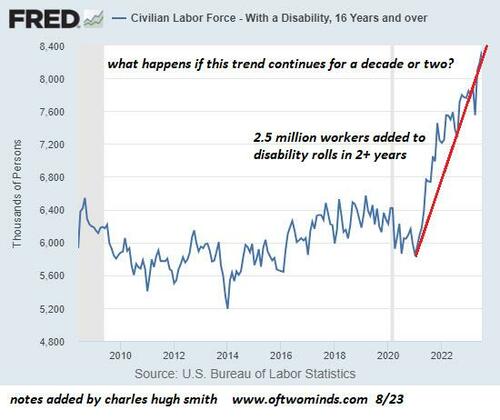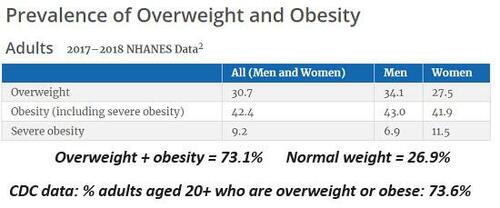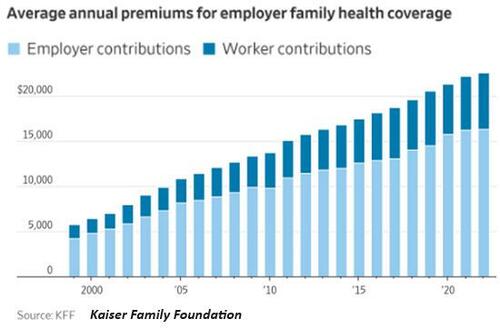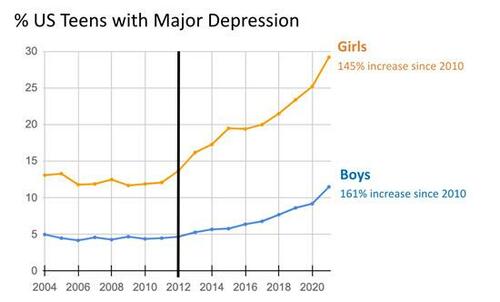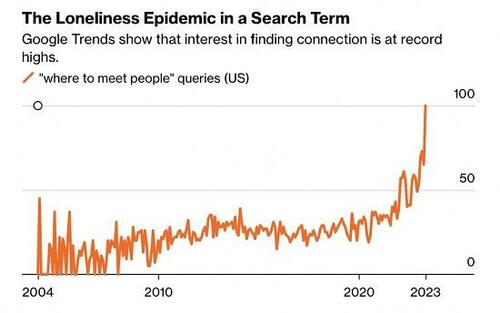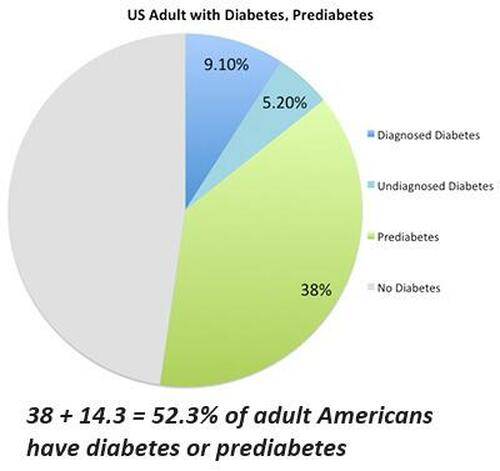
Authored by Charles Hugh Smith via OfTwoMinds blog,
We need a new definition of Progress, and a reset of the mythology guiding our descent into "Anti-Progress".
There's a curious disconnect between our glorification of Technological Progress and our real-world experience. If we step outside the tent of relentless propaganda touting science-fiction fantasies come to life--permanent bases on the Moon, limitless energy from fusion, etc.--we find that rather than everyday life getting better--the core meaning of Progress--we find that everyday life is getting harder. I call this Anti-Progress--the opposite of Progress.
Buried beneath the thrills of science-fiction fantasies come to life, real life is characterized by the accelerating descent into Anti-Progress.
Consider a raw carrot. In the current system of Progress, the most important feature of a raw carrot is its low profitability. There is little that promotion, branding or "innovation" can do to persuade consumers to pay more for a raw carrot.
The most important feature of a raw carrot to the human body is that it is a natural food packed with nutrients and fiber. It is easy to store and transport and can be eaten raw or cooked. It can be eaten alone or mixed into stews, soups, salads and casseroles. A raw carrot is a healthy snack.
None of this overcomes its terrible, unfixable flaw: it doesn't lend itself to Progress, i.e. boosting profits. The Progress solution to this inherent flaw is to process the carrot into a product that can be marketed as an advance (i.e. Progress) in convenience, novelty, status and engagement (i.e. dopamine rush / addiction), attributes the consumer will pay more for.
A few shreds of the carrot are cooked into mush and added to a concoction of potato starch, sugar and low-quality fat that is dyed with artificial colors to match a carrot's color and marketed as a "veggie snack" ("contains real carrots!").
The nutritional value of the product is nil and the health consequences of consuming what is basically a greasy sugary confection are negative. The list of chronic diseases incurred by a diet of such highly processed food is long.
This engineered snack, deceptively marketed as "veggie" to deceive parents into assuming it is a "healthy snack," is immensely profitable, and so the system cheers the soaring sales and profits.
The engagement/addiction aspect of this product is especially pernicious, as it is specifically designed to hijack the human brain's reward centers much like a powerful drug. Its mouthfeel and heavy doses of sugar, salt and fat activate our hard-wired predilection for what is scarce in the hunter-gatherer diet: salt, fats and sweets. Eating this snack generates an immediate reward: a pleasurable dopamine rush. Bet you can't just have one.
Not only is this confection devoid of nutrition, it's designed to be addictive. As every drug dealer knows, there's nothing more profitable than an addiction that generates reliable demand.
This describes not just addictive drugs and processed foods; it describes the whole of consumerism, which carefully cultivates addiction as the defining dynamic not just of Progress but of every-day life.
Should any consumers lodge a complaint about the deceptively advertised "veggie snack" with the agencies tasked with protecting public health, they will find the corporate lobbyists have neutered public influence by spending whatever sums of money are needed to buy the compliance of regulators, what's known as regulatory capture.
The product is declared safe and anyone complaining about the deceptive packaging is told that it's up to consumers to choose what to buy or not buy: caveat emptor, buyer beware.
This process of boosting profits by masking the negative consequences is not just rational in the system of Progress, it's the only path: any CEO who chooses not to maximize profits and buy political influence is fired for incompetence.
This reveals the pathological nature of organizing an economy and society around promoting a mythology that equates expanding consumption with Progress.
Anyone who describes the system as it truly is must be marginalized with an accusation of violating the American taboo against negativity. Not finding a silver lining is an unforgiveable sin: just as you must cheer technological Progress, you must be relentlessly positive. An entire library of cheery slogans is at the ready to ensure the proper dose of positive spirit has been administered, no matter how insincerely. If life gives you lemons, make lemonade.
So when we move to the response to the diseases generated by a diet of addictive processed foods--the immensely profitable market for pharmaceuticals that alleviate the symptoms of the diseases caused by consuming processed foods--we find a happy marriage of profits reaped by generating lifestyle diseases and an equally profitable alleviation of symptoms.
There are numerous subsidiary winners in this Anti-Progress profit bonanza: university research funded by corporate interests, lobbying firms handsomely paid to dig regulatory moats, politicians harvesting campaign contributions, think-tanks paid to distribute the apologists' favorite cover-story, "the free market," speculators scheming to cash in on a heavily hyped initial public offering (IPO), and so on.
Once we tune in to the siren songs of Progress, we hear them everywhere. The smart phone is a wonder, for what could be better than having shopping, hyper-addictive games and social media at our fingertips, an addictive device that enables access to a wealth of other addictions?
Just as the consequences of consuming the "veggie snack" are hidden, so are the consequences of glorifying addictive technologies as Progress.
Healthy human life is constructed of relationships between individuals, families, communities, the natural world and the moral universe.
Our economic system of Progress severs all these links as impediments to expanding consumption and profits via addiction, obsolescence, insecurity and narcissism. From the perspective of a healthy human life, these are the perfection of Anti-Progress.
How can soaring rates of diabetes and prediabetes be Progress? Clearly, this is Anti-Progress.
How can soaring rates of disability be Progress? Clearly, this is Anti-Progress.
How can soaring rates of metabolic disorders be Progress? Clearly, this is Anti-Progress.
How can soaring costs of basic healthcare insurance be Progress? Clearly, this is Anti-Progress.
How can soaring rates of teen depression be Progress? Clearly, this is Anti-Progress.
How can increasing loneliness be Progress? Clearly, this is Anti-Progress.
While returning to the Moon and AI apps are touted as "proof" of Progress, real-world life is most accurately described as snowballing Anti-Progress. We need a new definition of Progress, and a reset of the mythology guiding our descent into Anti-Progress. That's the topic of my new book, The Mythology of Progress, Anti-Progress and a Mythology for the 21st Century.
* * *
Authored by Charles Hugh Smith via OfTwoMinds blog,
We need a new definition of Progress, and a reset of the mythology guiding our descent into “Anti-Progress”.
There’s a curious disconnect between our glorification of Technological Progress and our real-world experience. If we step outside the tent of relentless propaganda touting science-fiction fantasies come to life–permanent bases on the Moon, limitless energy from fusion, etc.–we find that rather than everyday life getting better–the core meaning of Progress–we find that everyday life is getting harder. I call this Anti-Progress–the opposite of Progress.
Buried beneath the thrills of science-fiction fantasies come to life, real life is characterized by the accelerating descent into Anti-Progress.
Consider a raw carrot. In the current system of Progress, the most important feature of a raw carrot is its low profitability. There is little that promotion, branding or “innovation” can do to persuade consumers to pay more for a raw carrot.
The most important feature of a raw carrot to the human body is that it is a natural food packed with nutrients and fiber. It is easy to store and transport and can be eaten raw or cooked. It can be eaten alone or mixed into stews, soups, salads and casseroles. A raw carrot is a healthy snack.
None of this overcomes its terrible, unfixable flaw: it doesn’t lend itself to Progress, i.e. boosting profits. The Progress solution to this inherent flaw is to process the carrot into a product that can be marketed as an advance (i.e. Progress) in convenience, novelty, status and engagement (i.e. dopamine rush / addiction), attributes the consumer will pay more for.
A few shreds of the carrot are cooked into mush and added to a concoction of potato starch, sugar and low-quality fat that is dyed with artificial colors to match a carrot’s color and marketed as a “veggie snack” (“contains real carrots!”).
The nutritional value of the product is nil and the health consequences of consuming what is basically a greasy sugary confection are negative. The list of chronic diseases incurred by a diet of such highly processed food is long.
This engineered snack, deceptively marketed as “veggie” to deceive parents into assuming it is a “healthy snack,” is immensely profitable, and so the system cheers the soaring sales and profits.
The engagement/addiction aspect of this product is especially pernicious, as it is specifically designed to hijack the human brain’s reward centers much like a powerful drug. Its mouthfeel and heavy doses of sugar, salt and fat activate our hard-wired predilection for what is scarce in the hunter-gatherer diet: salt, fats and sweets. Eating this snack generates an immediate reward: a pleasurable dopamine rush. Bet you can’t just have one.
Not only is this confection devoid of nutrition, it’s designed to be addictive. As every drug dealer knows, there’s nothing more profitable than an addiction that generates reliable demand.
This describes not just addictive drugs and processed foods; it describes the whole of consumerism, which carefully cultivates addiction as the defining dynamic not just of Progress but of every-day life.
Should any consumers lodge a complaint about the deceptively advertised “veggie snack” with the agencies tasked with protecting public health, they will find the corporate lobbyists have neutered public influence by spending whatever sums of money are needed to buy the compliance of regulators, what’s known as regulatory capture.
The product is declared safe and anyone complaining about the deceptive packaging is told that it’s up to consumers to choose what to buy or not buy: caveat emptor, buyer beware.
This process of boosting profits by masking the negative consequences is not just rational in the system of Progress, it’s the only path: any CEO who chooses not to maximize profits and buy political influence is fired for incompetence.
This reveals the pathological nature of organizing an economy and society around promoting a mythology that equates expanding consumption with Progress.
Anyone who describes the system as it truly is must be marginalized with an accusation of violating the American taboo against negativity. Not finding a silver lining is an unforgiveable sin: just as you must cheer technological Progress, you must be relentlessly positive. An entire library of cheery slogans is at the ready to ensure the proper dose of positive spirit has been administered, no matter how insincerely. If life gives you lemons, make lemonade.
So when we move to the response to the diseases generated by a diet of addictive processed foods–the immensely profitable market for pharmaceuticals that alleviate the symptoms of the diseases caused by consuming processed foods–we find a happy marriage of profits reaped by generating lifestyle diseases and an equally profitable alleviation of symptoms.
There are numerous subsidiary winners in this Anti-Progress profit bonanza: university research funded by corporate interests, lobbying firms handsomely paid to dig regulatory moats, politicians harvesting campaign contributions, think-tanks paid to distribute the apologists’ favorite cover-story, “the free market,” speculators scheming to cash in on a heavily hyped initial public offering (IPO), and so on.
Once we tune in to the siren songs of Progress, we hear them everywhere. The smart phone is a wonder, for what could be better than having shopping, hyper-addictive games and social media at our fingertips, an addictive device that enables access to a wealth of other addictions?
Just as the consequences of consuming the “veggie snack” are hidden, so are the consequences of glorifying addictive technologies as Progress.
Healthy human life is constructed of relationships between individuals, families, communities, the natural world and the moral universe.
Our economic system of Progress severs all these links as impediments to expanding consumption and profits via addiction, obsolescence, insecurity and narcissism. From the perspective of a healthy human life, these are the perfection of Anti-Progress.
How can soaring rates of diabetes and prediabetes be Progress? Clearly, this is Anti-Progress.
How can soaring rates of disability be Progress? Clearly, this is Anti-Progress.
How can soaring rates of metabolic disorders be Progress? Clearly, this is Anti-Progress.
How can soaring costs of basic healthcare insurance be Progress? Clearly, this is Anti-Progress.
How can soaring rates of teen depression be Progress? Clearly, this is Anti-Progress.
How can increasing loneliness be Progress? Clearly, this is Anti-Progress.
While returning to the Moon and AI apps are touted as “proof” of Progress, real-world life is most accurately described as snowballing Anti-Progress. We need a new definition of Progress, and a reset of the mythology guiding our descent into Anti-Progress. That’s the topic of my new book, The Mythology of Progress, Anti-Progress and a Mythology for the 21st Century.
* * *
Loading…
